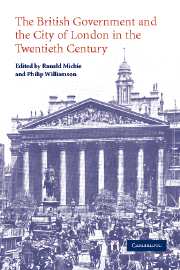Book contents
- Frontmatter
- Contents
- Notes on contributors
- Acknowledgements
- Conventions and abbreviations
- Introduction
- Part I The long perspective
- Part II Markets and society
- Part III Government and political parties
- 6 The Treasury and the City
- 7 The Liberals and the City 1900–1931
- 8 The Conservatives and the City
- 9 Labour party and the City 1945–1970
- Part IV The interwar period
- Part V 1945–2000
- Select bibliography
- Index
7 - The Liberals and the City 1900–1931
Published online by Cambridge University Press: 04 July 2009
- Frontmatter
- Contents
- Notes on contributors
- Acknowledgements
- Conventions and abbreviations
- Introduction
- Part I The long perspective
- Part II Markets and society
- Part III Government and political parties
- 6 The Treasury and the City
- 7 The Liberals and the City 1900–1931
- 8 The Conservatives and the City
- 9 Labour party and the City 1945–1970
- Part IV The interwar period
- Part V 1945–2000
- Select bibliography
- Index
Summary
Until comparatively recently, historians have often accepted uncritically the notion that the City of London was able to exert a primary influence on economic policy-making by the British state. Balanced budgets, the gold standard, and adherence to free trade have all been put down to the power of the City of London. In a subtler variation, Peter Cain and Anthony Hopkins have ascribed predominant influence to a social nexus between the City and the aristocracy, the fusion of the wealth of the City with that of landed society. Despite the industrial revolution, they suggest that ‘gentlemanly capitalism’ had relegated industrial power to the margins of political influence. In the Edwardian period, the failure of tariff reform with its promise of modernisation and industrial regeneration has similarly been attributed to the power of ‘cosmopolitan’ capital, embodied in the City, which was able, in conjunction with other forces, to undermine the ‘productivist’ vision of Joseph Chamberlain. For many in the City, it is held, the beau idéal was to create in Britain a paradise for rentiers, with the grimy-handed workers shipped off to their paradise in the colonies, removing the threat of proletarian revolution as well as that of environmental deterioration from excessive industrialisation. This type was well observed by Beatrice Webb in the person of her brother-in-law, Daniel Meinertzhagen:
a great City financier, earning his tens of thousands each year, upright and honourable, cordially hating the ‘social question’, describing frankly his ideal: English capitalists retired from business living on an income of foreign investments, the land given over to sport, the people emigrated or starved out, no inhabitants except a few dependents to serve in one way or another the fortunate capitalists.
- Type
- Chapter
- Information
- Publisher: Cambridge University PressPrint publication year: 2004



